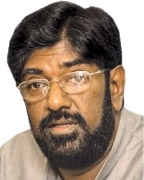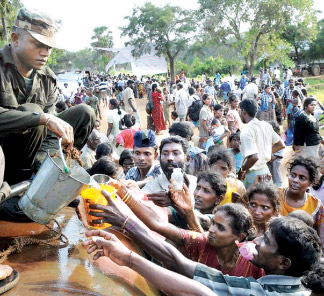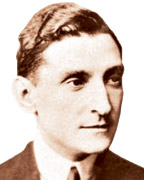Partisan Amnesty International targets Sri Lanka
Lakshman I. Keerthisinghe LLB, LLM.MPhil,
Attorney-at-Law
 The cold neutrality of
an impartial judge The cold neutrality of
an impartial judge
- Edmund Burke
- Preface to the
Address of M. Brissot
Reuters reported recently that Amnesty says Sri Lanka represses
dissent to consolidate power. The report stated that Amnesty
International said that the Sri Lankan government is intensifying a
crackdown on critics in order to tighten its grip on power, and urged
the Commonwealth countries not to hold a summit there in November. But
the Media Minister Keheliya Rambukwella accused Amnesty International of
being in the pay of supporters of the Liberation Tigers of Tamil Eelam
(LTTE), once known as the most brutal terrorist organization in the
world defeated in a nearly 30-year war that ended in May 2009. The
Minister further stated that Amnesty is always against Sri Lanka and
they never see anything positive. “We accept still there are some
problems, but they need to see what we have done good also."
 |
|
Minister Keheliya Rambukwella |
The London-based rights group, citing specific rights abuses in a
78-page report entitled 'Sri Lanka's Assault on Dissent' said a
crackdown on critics had intensified through threats, harassment,
imprisonment and violent attacks."Violent repression of dissent and the
consolidation of political power go hand in hand in Sri Lanka," said
Polly Truscott, Amnesty International's Deputy Asia Pacific
Director."Over the past few years we have seen space for criticism
decrease. There is a real climate of fear in Sri Lanka, with those brave
enough to speak out against the government often having to suffer badly
for it."
Human rights activists
The rights group further said the report was based on interviews with
witnesses, lawyers and activists, legal affidavits, court records,
reports by Sri Lankan, United Nations and international human rights
organizations, as well as local and international media reports.
The report also said journalists, the judiciary, human rights
activists and opposition politicians were among those who have been
targeted in a pattern of government-sanctioned abuse, often involving
the Security Forces or their proxies.
Amnesty International was founded in London in July 1961 by English
labour lawyer Peter Benenson According to his own account, he was
traveling in the London Underground on November 19, 1960 when he read of
two Portuguese students from Coimbra who had been sentenced to seven
years of imprisonment in Portugal for allegedly "having drunk a toast to
liberty."
Researchers have never traced the alleged newspaper article in
question. In 1960, Portugal was ruled by the Estado Novo government of
Antonio de Oliveira Salazar. The government was authoritarian in nature
and strongly anti-communist, suppressing enemies of the state as
anti-Portuguese.
 |
|
Security Forces personnel helping
Northern civilians who were held as human shields by the
LTTE |
In his significant newspaper article "The Forgotten Prisoners",
Benenson later described his reaction as follows: "Open your newspaper
any day of the week and you will find a story from somewhere of someone
being imprisoned, tortured or executed because his opinions or religion
are unacceptable to his government. The newspaper reader feels a
sickening sense of impotence. Yet if these feelings of disgust could be
united into common action, something effective could be done."
Public opinion
The article described these violations occurring, on a global scale,
in the context of restrictions to press freedom, to political
oppositions, to timely public trial before impartial courts, and to
asylum.
It marked the launch of "Appeal for Amnesty, 1961", the aim of which
was to mobilise public opinion, quickly and widely, in defence of these
individuals, whom Benenson named "Prisoners of Conscience". The "Appeal
for Amnesty" was reprinted by a large number of international
newspapers.
In the same year Benenson had a book published, Persecution 1961,
which detailed the cases of nine prisoners of conscience were
investigated and compiled by Benenson and Baker.
In July 1961 the leadership had decided that the appeal would form
the basis of a permanent organisation, Amnesty, with the first meeting
taking place in London.
Benenson ensured that all three major political parties were
represented, enlisting Members of Parliament from the Labour Party, the
Conservative Party and the Liberal Party On September 30,1962, it was
officially named 'Amnesty International'. Between the 'Appeal for
Amnesty, 1961' and September 1962 the organisation had been known simply
as 'Amnesty'.
Amnesty International is financed largely by fees and donations from
its worldwide membership. It says that it does not accept donations from
governments or governmental organisations.
According to the AI website, "these personal and unaffiliated
donations allow AI to maintain full independence from any and all
governments, political ideologies, economic interests or religions.
We neither seek nor accept any funds for human rights research from
governments or political parties and we accept support only from
businesses that have been carefully vetted. By way of ethical
fundraising leading to donations from individuals, we are able to stand
firm and unwavering in our defence of universal and indivisible human
rights."
However, AI did receive grants from the UK Department of
International Development the European Commission the US State
Department and other governments contrary to its aforesaid policies. In
November 2012, the Amnesty staff in London went on strike to protest
work conditions and financial issues with the organisation. Gerald
Steinberg, of NGO Monitor said, "They really are in trouble. They’ve
been in crisis for a number of years."
 |
|
Peter
Benenson |
 |
|
Antonio de
Oliveira Salazar |
Criticism of Amnesty International includes claims of excessive pay
for management, under-protection of overseas staff, associating with
organisations with a dubious record on human rights protection,
selection bias, ideological/foreign policy bias against either
non-Western countries or Western-supported countries, criticism of
Amnesty's policies relating to abortion, and assertion that "defensive
jihad" is not antithetical to human rights. Governments who have
criticised Amnesty include those of Canada Israel, Iran, Saudi Arabia,
the Democratic Republic of the Congo the People's Republic of China,
Vietnam, Russia and the United States, for what they assert is one-sided
reporting or a failure to treat threats to security as a mitigating
factor.
The actions of these governments—and of other governments critical of
Amnesty International have been the subject of human rights concerns
voiced by Amnesty. As of February 2011, Amnesty is engaged in a dispute
with the British union ‘Unite over Amnesty’ allegedly attempting to
de-recognize some of its foreign-based workers' rights.(Wikepedia)
Welfare activities
In the above scenario it is an open secret that cash strapped Amnesty
may receive funds from the diaspora and the TGTE who are hell bent on
destabilizing the legitimately elected Sri Lankan government and
replacing it with a puppet regime amenable to the US and its Western
allies in order to gain support for their separatist agenda to establish
a State of Eelam in the North and East of Sri Lanka.
The reporting by the Amnesty is therefore biased and one sided as
Minister Rambukwella very correctly stated thereby ignoring all the
welfare activities undertaken by the Sri Lankan government for the
rehabilitation of the former LTTE cadres, providing them with funding,
employment and housing and the replacement of the displaced persons
during the conflict by returning them to live happily in their former
areas where they lived prior to the unfortunate civil war.
In conclusion it is noteworthy to consider whether the Amnesty
International could maintain impartiality in its reports emulating the
cold neutrality of an impartial judge as quoted at the outset of this
piece as it is obvious that cash strapped AI has to do the bidding of
its paymasters.
|





